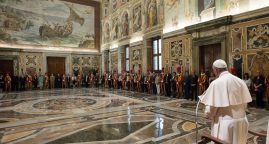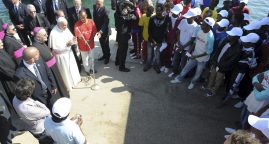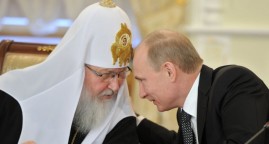Pope Francis the diplomat: Stamping out conflict remains the priority
The Holy See is playing a central role on the world stage, in Latin America in particular but elsewhere too. A look at its relations with Moscow and Washington, the dominant axis with the UN and its international action in service of the poor. As new and serious crises loom on the horizon, the Pope meet ambassadors on 11 January.
Francis is a Pope of simple words, who is capable of talking openly with faithful of all nationalities, a Pope who has no need for mediators and “interpreters”, at the same time he is a world leader who was able to give a new boost to Vatican diplomacy, changing its tracks. Naturally the Secretariat of State – headed by Cardinal Pietro Parolin, former Nuncio to Venezuela, who is familiar with the workings of the Curia – played a decisive role in this.
Although the line of mediation and political dialogue followed by the Holy See has some traditional constants – its relations with the UN for instance – its muscles were flexed in a unique way in Latin America. After the Cold War, Francis uprooted the Holy See from its privileged (though not exclusive) position in the Atlantic axis, establishing direct and independent relations with yesterday and today’s superpowers. For sure the Holy See’s efforts against the war and in favour of a dialogue between cultures, religions and governments followed along the path traced by the previous Popes.
Read the full article on Vatican Insider
Related Articles
Diplomacy for solidarity
05/19/2016. Pope Francis received Ambassadors from Estonia, Malawi, Namibia, the Seychelles, Thailand and Zambia, who together presented their Letters of Credence on May 19th
New Vatican emphasis on ‘20 action points’ for migrants, refugees
11/08/2017. In recent days, Pope Francis and a Vatican official have cited “Responding to Migrants and Refugees: Twenty Action Points”
Is Putin behind the meeting between the Pope and the Patriarch of Moscow?
02/06/2016. Should we see, behind the meeting between Pope Francis and the Patriarch Kirill, the hand of Putin?






